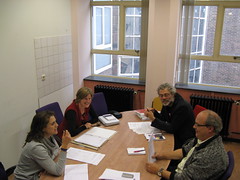A quote from the Journal of Business Ethics (Volume 8, Number 8 / August, 1989 !!): "A bank's responsibility extends to Government, customers, shareholders, staff and the community. In the future, as we face increasingly complex and conflicting issues, our resolve and commitment to ethical behaviour will be tested." And so it has !

Recently, the media have been drawing our attention more and more often to the ethical dimensions of particular issues to be considered. Besides, there seems to be a growing receptiveness, among both educators and ordinary citizens, toward including ethics training in all types of education. From these developments one may conclude that a specific project on teaching ethical competences could hit the nail on its head.
This week 4 lecturers from the CMV department travelled to Lithuania for two days of intensive international discussions on that very issue. The Vilnius meeting formed the kick off for a new learning partnership (within the LLLP) focussing on teaching and evaluating ethical competences.
At Vilnius College of Higher Education we got to know each other first via presentations by each organisation separately, but also later by the collective sharing of values that we felt were ethical values to be taught in education.
Still, it's always the talks in between and the talks during breaks, lunches and dinners that people get to know each other best of all. This social networking is often crucial in establishing good working relationships in projects, especially to fall back on while working in your own home institutions before the next meeting comes up.
Exhausted and full of (international)ideas, having experienced fascinating exchanges with all the 6 other European partners, we returned back to the Netherlands.
Click here for a visual report of the meeting.

This project has been funded with support from the European Commission. This blog post reflects the views only of the author, and the Commission cannot be held responsible for any use which may be made of the information contained herein.
